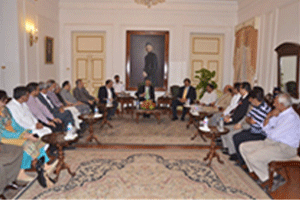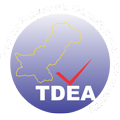April 10, 2017, will always be remembered in the legislative history of Sindh. On this day, the Governor of Sindh at that time, Mohammad Zubair, signed the Sindh Transparency and Right to Information (RTI) Bill, 2016 into law, ushering in an era of enhanced transparency by securing the right of every citizen of the province to access information in matters of public importance. A significant milestone in the journey towards strong public accountability and robust public participation in the democratic process, the legislation is not only a victory for advocates of greater transparency in governance but also a feather in the cap for USAID Citizens’ Voice Project (CVP) core mission of improving public accountability through effective engagement between citizens and the state. Two of CVP’s partner organizations in Sindh played critically important roles in drafting and promoting the bill. Shehri-CBE had drafted the Sindh RTI bill while the Council of Pakistan Newspaper Editors (CPNE) presented it to the then Chief Minister of Sindh, Qaim Ali Shah, on March 14, 2016.

Openness, transparency, and right to information are pillars of democracy, and essential steps in the exercise of political and economic powers by citizens. Article 19-A of the Constitution of Pakistan stipulates that every citizen shall have the right to access information in all matters of public importance. Ensuring transparency and access to information enables citizens to hold the government and its institutions accountable, promotes good governance practices, and encourages active citizenry. Conversely, absence of, or inaccessibility to information can often create a sense of disempowerment, mistrust, and frustration among citizens. Thus, it was necessary to enact such a law in Sindh, as had been done earlier in Khyber Pakhtunkhwa and Punjab, to promote citizens’ trust, confidence, and participation in democratic processes.
By partnering with Shehri-CBE and CPNE, USAID CVP provided a mechanism for evidence-based advocacy so that the citizens of Sindh secure their constitutionally guaranteed right to access information. To raise awareness on the right to information and build policy momentum for the RTI bill, Shehri CBE formed a 24-member Coalition for Transparency and Access to Information (C-TAI). The C-TAI also contributed to preparing a model RTI bill after consultation with various stakeholders from the province. Shehri-CBE also organized awareness-raising sessions on RTI in the province’s educational institutions.
Simultaneously, CPNE advocated the need for a robust RTI law and capacitated stakeholders in understanding its use. The organization conducted capacity-building sessions for working journalists to enable them to make effective use of the RTI law and organized advocacy meetings with representatives of various political parties in the Sindh Assembly. Moreover, CPNE formed a 36-member Network of Editors for RTI to inform and educate citizens about the enactment of the RTI law in Sindh.
CPNE presented the model draft of RTI bill prepared by C-TAI to then Chief Minister, Syed Qaim Ali Shah on March 14, 2016. On March 29, 2016, CPNE organized a seminar for the province’s legislators and members of the Network of Editors in Karachi, inviting them to review the model draft RTI bill that had been presented to the Chief Minister.
Sindh Minister for Parliamentary Affairs, Mr Nisar Ahmed Khuhro tabled the model draft of RTI bill in the provincial assembly on September 22, 2016. The bill was referred to a 10-member multi-party Select Committee for review and finalization. The Select Committee, headed by Mr. Khuhro, finalized the draft bill after a series of consultative meetings. Representatives from Shehri-CBE were invited to attend these meetings as the only non-member representation for assisting the Select Committee in finalizing the draft bill.
While talking about the enactment of Sindh’s RTI law, Mr. Nisar Ahmed Khuhro said, “Sindh RTI Bill was presented in Sindh Assembly in 2016 and a Select Committee was formulated by the Assembly to finalize the draft. The parliamentary leaders of all the political parties, under my chairmanship, were part of the committee. The committee invited suggestions from provinces where such a law was already in place and also consulted with organizations like Shehri and CPNE. After extensive discussions, the bill was prepared, presented, and passed from the Sindh Assembly unanimously. The bill has now become a law. Today, any citizen can acquire information on the performance of government departments and even that of Judiciary, Governor House, and Chief Minister House.”
The efforts of USAID CVP and its partner organizations culminated in the unanimous passage of the Sindh Transparency and Right to Information Bill, 2016, by the Sindh Assembly on March 13, 2017. Soon after that, on March 28, 2017, a CPNE delegation called on the Sindh governor to persuade him to sign the Sindh Transparency and RTI Bill 2016 into law. Finally, on April 10, 2017, the governor signed the RTI bill into law. The follow up of these two civil society organizations continued even after the USAID grant had closed out. It is evidence of dividends brought by consistent, evidence-based advocacy and leadership by the Pakistani civil society.
The experiences of Khyber Pakhtunkhwa and Punjab demonstrate that once citizens start effectively using their right to access information, the state and its institutions become more responsive to their needs and more transparent in their functioning.




















